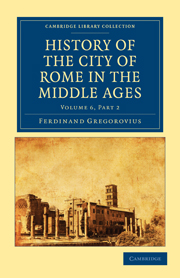CHAPTER I
Published online by Cambridge University Press: 05 July 2011
Summary
The action brought by Albornoz against Cola's murderers was afterwards quashed, and an amnesty issued by the Pope. The two civic factions again occupied the Senate, and everything seemed to have reverted to its former condition. Meanwhile, the state of Italy invited the presence of Charles, King of Bohemia.
At this time, when the existing balance of power seemed about to be destroyed, the political life of the Italians centred round two cities, the Guelf republic of Florence, the last representative of national and municipal liberty, and Ghibelline Milan, where the reigning despot, the Archbishop John Visconti, transformed the city from a city-tyranny into a principality. After suffering a terrible defeat at the hands of the Venetians on August 29, 1353, even Genoa entrusted her signory to this powerful despot. Florence had long striven to unite Tuscany, the Romagna, Rome, and Naples in an alliance under the authority of the Pope, in order to impose a check on the Visconti and to keep the Emperor at a distance. A parliament had been convoked at Arezzo, and Clement VI. had at first zealously encouraged the scheme. But it was shattered by mutual distrust, and the Florentines at length found themselves obliged to desire the arrival of the King of the Romans, to deliver them from the threatening power of the Visconti. For a moment they still hoped to see the successor of Clement VI. at the head of the Guelf league, and Charles's journey to Rome deferred; but finding themselves deceived, they were reluctantly forced to enter into negotiations with the King.
- Type
- Chapter
- Information
- History of the City of Rome in the Middle Ages , pp. 377 - 434Publisher: Cambridge University PressPrint publication year: 2010First published in: 1898



